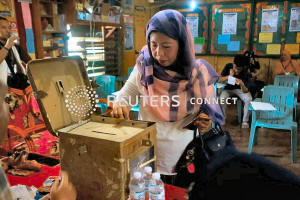|
Philippine referendum returns big 'yes'
vote on Bangsamoro self-rule
 Send a link to a friend
Send a link to a friend
 [January 26, 2019]
By Martin Petty [January 26, 2019]
By Martin Petty
MANILA (Reuters) - A predominantly Muslim
area of the southern Philippines has returned a resounding "Yes" in this
week's referendum on greater autonomy, boosting hopes for peace in one
of Asia's most conflict-torn regions.
The plan to create a self-administered area for the Muslim-dominated
parts of Mindanao was backed by 85 percent of voters, the election
commission said late on Friday, paving the way for a three-year
transition toward elections for a legislature that will choose an
executive.
Monday's referendum was the culmination of a tumultuous peace process
between separatists and successive governments that aimed to settle
decades of conflict, which have hampered development and kept these
parts of Mindanao among Asia's poorest regions.
The instability and high rates of unemployed, unschooled youth made the
areas fertile recruitment ground for bandits and Islamist extremists,
who exploited grievances about neglect and stoked narratives of
government duplicity in the peace process.

The endorsement by some 1.74 million voters comes as no surprise, and
the new region to be called Bangsamoro (nation of Moros) will have
greater powers to generate and invest more money in infrastructure,
schools, healthcare and social welfare for its estimated 5 million
inhabitants.
A ballot will now be held on Feb. 6 to ask several other areas if they
want to join.
The central government will oversee defense, security, and foreign and
monetary policy, and soon appoint a transition authority nominated by
the Moro Islamic Liberation Front (MILF).
(GRAPHIC: Philippine referendum on Muslim autonomous region - https://tmsnrt.rs/2Hk3s7L)
Vice President Leni Robredo said it was vital the central government
helps Bangsamoro to build "a progressive economy and responsible local
government".
"Let us guard and support the progress of this process because this is
not yet the end of the fight for peace," Robredo said.
[to top of second column]
|

A woman casts her vote during the plebiscite on Bangsamoro Organic
Law (BOL) at a voting precinct in Sultan Kudarat, Maguindanao
province, Philippines January 21, 2019. REUTERS/Marconi B. Navales/File
Photo

The vote came at a critical time for the Philippines, which saw
disillusioned MILF factions break away and follow other armed groups
in pledging allegiance to Islamic State.
That has stoked fears that fighters fleeing Iraq and Syria would
join radicals from Malaysia and Indonesia in gravitating to Mindanao
to capitalize on porous borders, jungles and mountains, and an
abundance of arms.
Martial law has been in place in Mindanao since an extremist
alliance overran Marawi City in 2017 and occupied it for five
months, in what was the Philippines' fiercest and longest conflict
since World War Two.
The army said three remnants of that alliance were killed on
Thursday when troops discovered a makeshift jungle camp. It released
images of trenches and what it said was Islamic State paraphernalia.
Mohagher Iqbal, the MILF's top peace negotiator, said on TV on
Thursday that he hoped radical splinters of the separatist group,
like those of the Bangsamoro Islamic Freedom Fighters (BIFF), would
recognize the will of the people for peace.
"One of the BIFF leaders has already reached out," he said, without
elaborating.
(Reporting by Martin Petty; Additional reporting by Neil Jerome
Morales; Editing by Tom Hogue)
[© 2019 Thomson Reuters. All rights
reserved.]
Copyright 2019 Reuters. All rights reserved. This material may not be published,
broadcast, rewritten or redistributed.
Thompson Reuters is solely responsible for this content.
 |